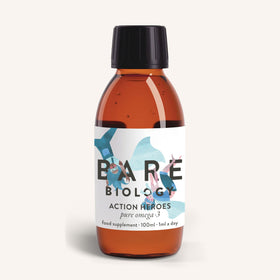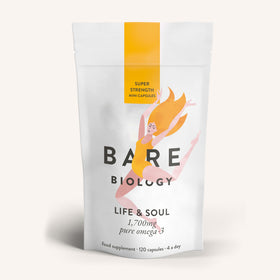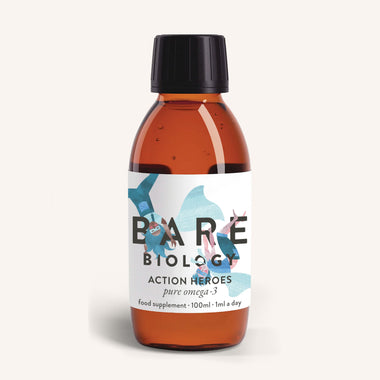Omega-3 for children
CONTENTS
Understanding Omega-3 Intake for Kids
We all want a long, healthy, successful life for our kids. And part of giving them the best start possible means ensuring they’re eating a healthy balanced diet. But besides all the fruit and vegetables, is your child getting enough omega-3?
From the brain development of infants to the general good health and wellbeing of our pre-teens, there are a wide range of omega-3 benefits for kids. But when it comes to making sure they’re eating enough of it in the form of oily fish, it’s not always so easy to get children to eat the required amounts.
In the UK, the minimum amount of fish recommended for children is 140g per week, about the size of a salmon filet. In reality, our kids aren’t getting nearly as much as this. According to the latest National Diet and Nutrition survey, they’re averaging just 18g per week - an eighth of what they should be eating for essential brain development.
So is it worth trying to get them to eat more oily fish, or will omega-3 fish oil supplements for children work just as well?
In this guide to omega-3 fish oil and children we’ll explain exactly what omega-3 can do for your little ones as they grow. We’ll tell you the best dietary sources of omega-3 for kids as well as give you tips on how to get your children to take omega-3 fish oil if you do decide to supplement their diets.

How does omega-3 help kids?
All children need omega-3. These essential fatty acids are the "building blocks" of fat, nutrients that are critical for the normal production of cells, muscles, nerves and organs. It’s important that children have a good supply of these healthy fats as they grow up.
But the DHA in omega-3 has been found to be particularly useful for children. That’s because it plays a role in the development of children’s brains and eyes.
The Role of Omega-3 in Children’s Brain, Eye and Cognitive Development
A growing brain will develop a huge number of cell membranes and neurons and all of them will be made of fat. But not just any fat. Unlike the rest of the body, the only fatty acid allowed into healthy grey matter in appreciable amounts is the omega-3 fatty acid, DHA. So recognised is the role of omega-3 in the brain, that the European Food Safety Authority (EFSA) approves the claim that DHA is needed to maintain normal brain function. Children’s brains develop rapidly, so they can benefit from a diet rich in omega-3 right from an early age. The most important brain growth is completed by six years of age and a child’s brain will increase in mass by 3.5 times by the age of five. No wonder mother nature found a way to ensure children got all the DHA they needed to support this hungry organ. DHA is found in high levels in human breast milk. Read more about the importance of omega-3 in pregnancy.
Like the brain, children’s eyes are highly enriched with the omega-3 fatty acids that started to accumulate there when they were in the womb. DHA is found in high concentrations in the retina (the layer of tissue that lines the inside of the eye and receives the image formed by the lens). As such, children’s eyes need a constant supply of DHA to work at their best. The European Food Safety Authority (EFSA) also approves the claim that DHA contributes to the maintenance of normal vision.
Fish has long been touted as good food for the brain. But while the role of omega-3 in the neural and eye development of children has been well-studied, the effects of DHA on learning, memory and concentration are not as clear cut. A study published in Neuropsychopharmacology showed the positive effect from a dosage of 480mg of DHA on cognition, behaviour and mood on children aged between 8 to 12, but other studies have found no effect. So while adding fatty acids to your child’s diet might help if your child struggles to concentrate, taking omega-3 for kids’ behaviour should only ever be used as part of a wider plan that includes behavioural strategies at school, exercise and an improved diet overall.
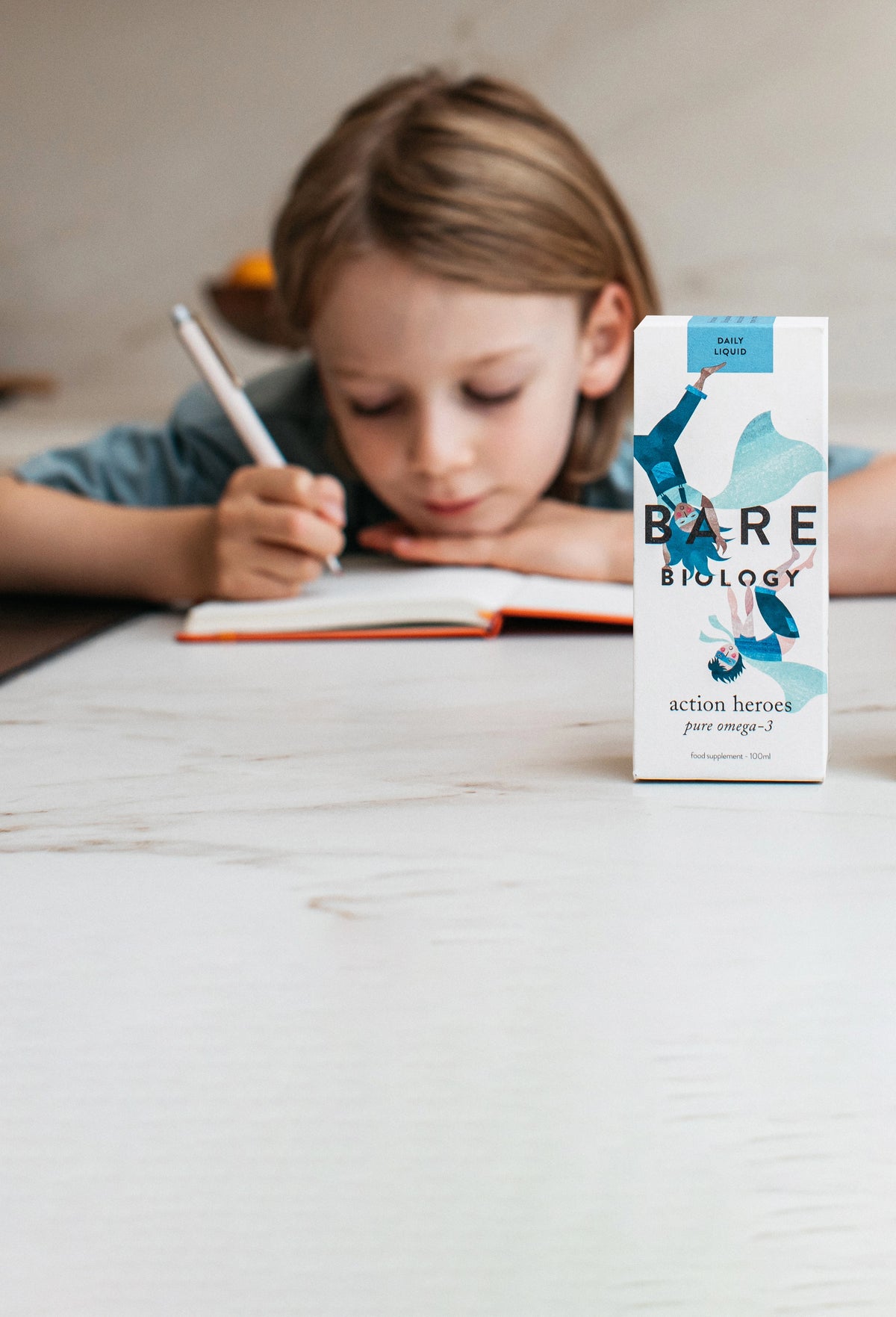

Why do children need to take omega-3?
While the DHA in omega-3 is vitally important to our kids, it’s something that children don’t make on their own, it has to come from their diets. Children can get vitamin D from sunlight, but the only way to make enough DHA to grow healthy brains is to eat it. DHA omega-3 is found in oily fish such as salmon and mackerel, it can be a chore to get children to eat enough each week. There’s also the problem of high levels of pollutants found in fish.
Heavy metals found in the bodies of fish can be particularly damaging to our brains, especially those of infants and young children. This is why pregnant women are advised to limit how much tuna they eat and to avoid some fish completely (like swordfish) due to high mercury levels. Taking a safe, pure omega-3 supplement for kids, such as our Action Heroes liquid, means you know they’re getting all the DHA they need, without the high levels of contaminants.
Can children take omega-3 supplements?
Omega-3 oils are safe for children to take and are generally really well-tolerated. You can give an omega-3 supplement to children from six months of age. Before that it’s not necessary. A baby’s supply of DHA will come from their formula (if you’re bottle-feeding) or your own breast milk (although it’s wise to take a pregnancy supplement such as Mums & Bumps omega-3 capsules to keep up your own supply).
Then from 6 months to 12 years, children can take a supplement, but how much you give them will vary between manufacturers. You’ll need to look at the recommendations on their product for the correct age-related dose. Action Heroes omega-3 liquid is suitable for children from six months to 12 years old. You can carry on giving it to children over 12, but we recommend switching older kids to our Life & Soul omega-3 liquid because teenagers would benefit from the higher amounts of EPA it contains.
How much fish oil is safe for a child?
You need to be careful when you’re buying omega-3 for children because certain products contain less omega-3 than others. This could mean your little ones would have to take a lot of oil or capsules to achieve the daily recommended amounts of omega-3. Having to take more oil than the recommended doses could lead to side effects such as indigestion or loose stools. To avoid this, only give children the recommended age-related doses provided with the product you’re using.
How much omega-3 can you give a child?
In the UK there is no specific recommendation of a dose of omega-3 for the general population, but in the US the national guidelines for adequate daily doses are:
- 0 to 12 months: 500mg per day
- 1 to 3 years: 700mg per day
- 4 to 8 years: 900mg per day
- 9 to 13 years (boys): 1,200mg per day
- 9 to 13 years (girls): 1,000mg per day
- 14 to 18 years (boys): 1,600mg per day
- 14 to 18 years (girls): 1,100mg per day
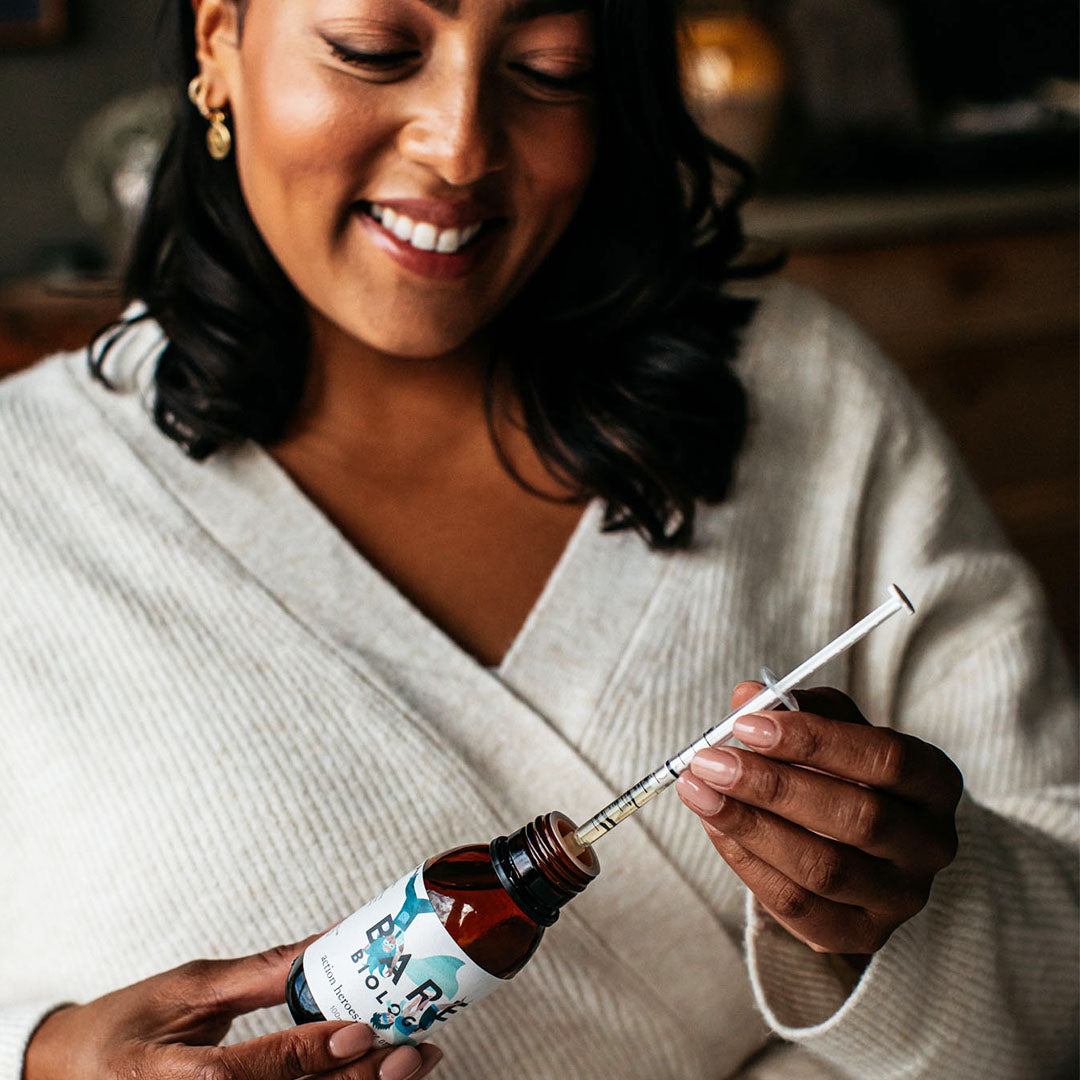
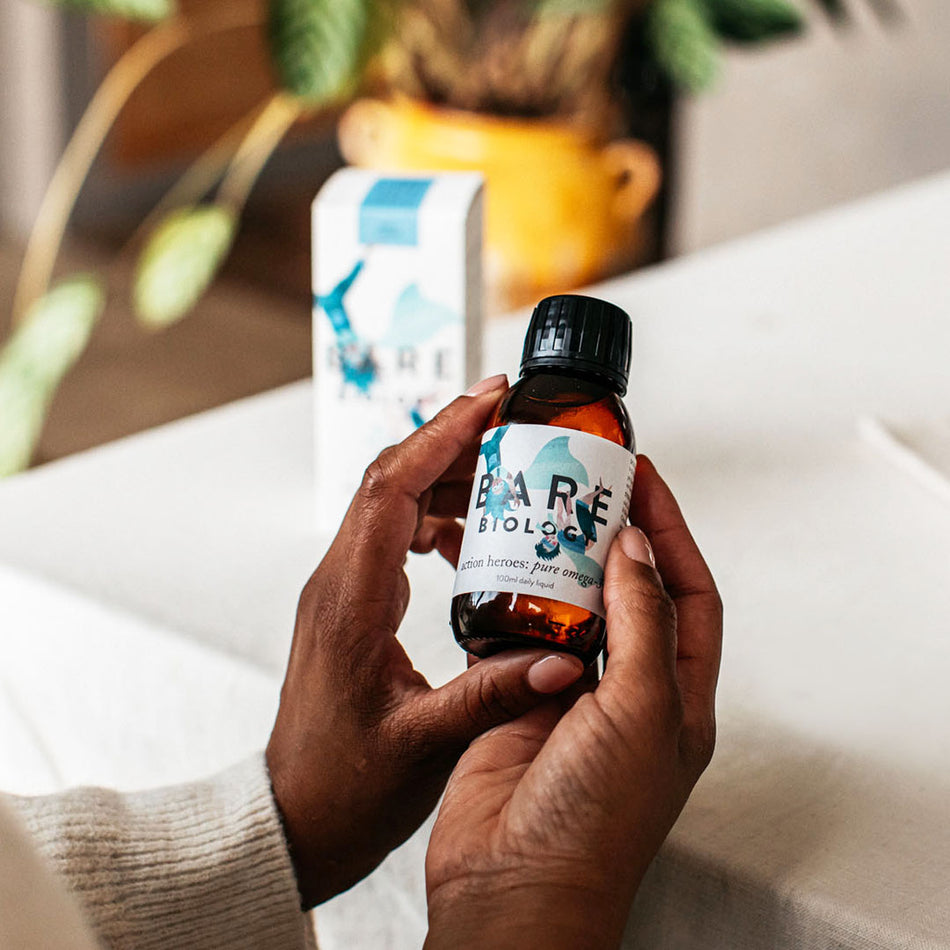
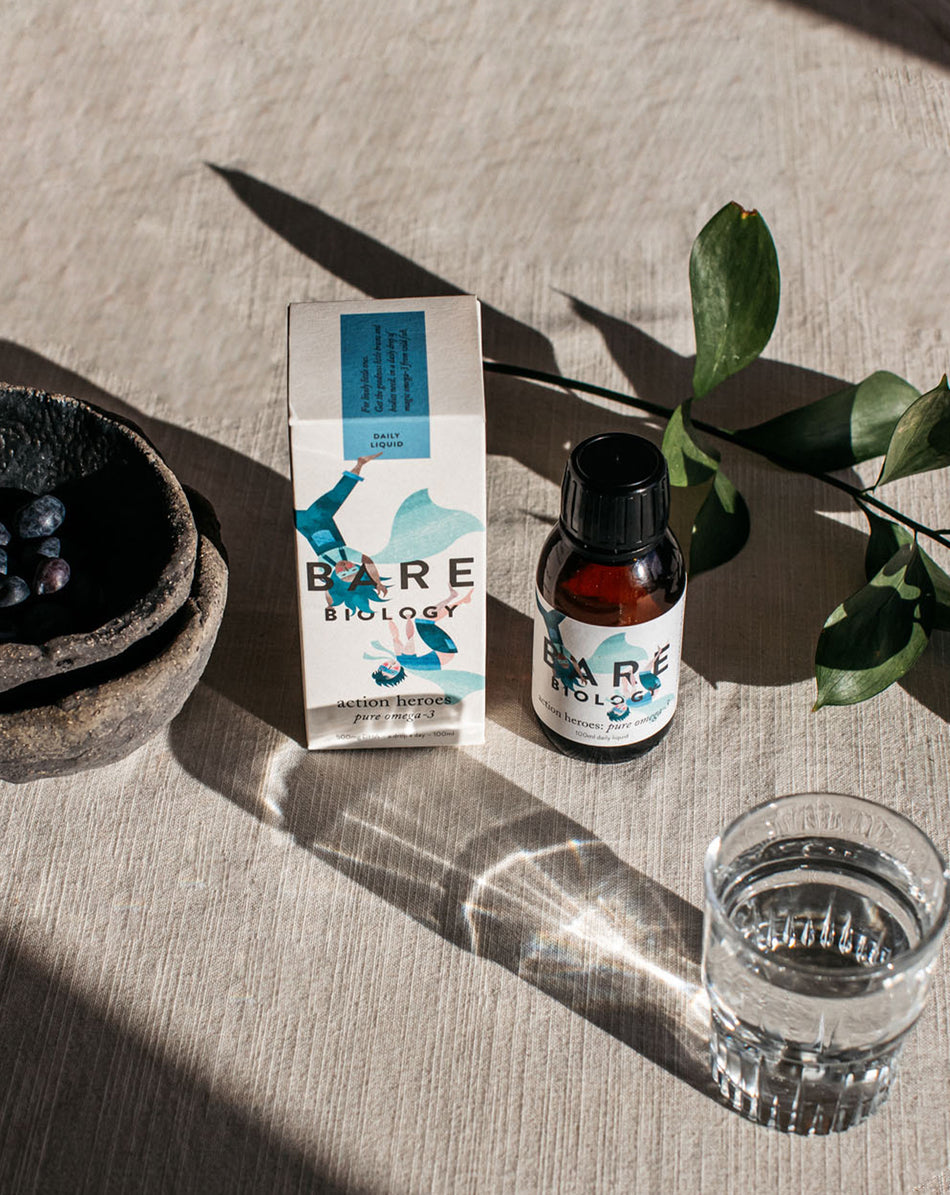
What’s the best omega-3 for children?
The best omega-3 for kids is one that contains high amounts of DHA. The DHA found in omega-3 fish oil is used by the brain in preference to any other fatty acids. When the brain doesn’t have a good supply of DHA, it will turn to other fats to help it develop and grow - but it doesn’t do this very well.
That’s why children need DHA and they can only get it from their diet or supplements. But remember that no two supplements are the same and some products contain less DHA than others.
Looking for a highly-concentrated, pure fish oil means you’ll be getting more omega-3 in each dose. And that’s why we created our Action Heroes liquid for kids. Because it’s so concentrated, you get 630mg of omega-3 (that’s 500mg DHA and 130mg EPA) in one tiny 1ml drop. This is as much as a whole tin of sardines (with bones) and a lot easier to get into kids.
Do toddlers need omega-3?
Toddlers should really be eating at least one portion of oily fish per week, but currently the UK’s most notoriously fussy eaters are only getting about 25% of the DHA they need for healthy brain development.
If you find it hard to give your toddler fish, supplementing with a good quality fish oil is a great alternative. Be sure to choose an oil that’s from the body of the fish, rather than the liver (such as cod liver oil) as these are also high in vitamin A which isn’t a good idea for toddlers. Too much vitamin A in its active, supplement form can cause short term problems such as nausea, headaches and dizziness, while long-term effects include liver problems and disorders of the central nervous system.
Choose a liquid omega-3 supplement for toddlers, as opposed to capsules or gums, to minimise any risk of choking. Plus with liquid supplements you can start off with a smaller dose and work your way up, to check that it’s well-tolerated by your toddler. Our Action Heroes liquid comes with a 1ml syringe so it’s easy to just give half a dose if you prefer.
What are the best dietary sources of omega-3 for kids?
Examples of oily fish include salmon, mackerel, trout, sardines and fresh tuna. Some good omega-3 foods for toddlers would be homemade fish cakes or fish pie. Unfortunately tinned tuna doesn’t make such a great omega-3 food source for children, as most of the essential fats are removed during the canning process.
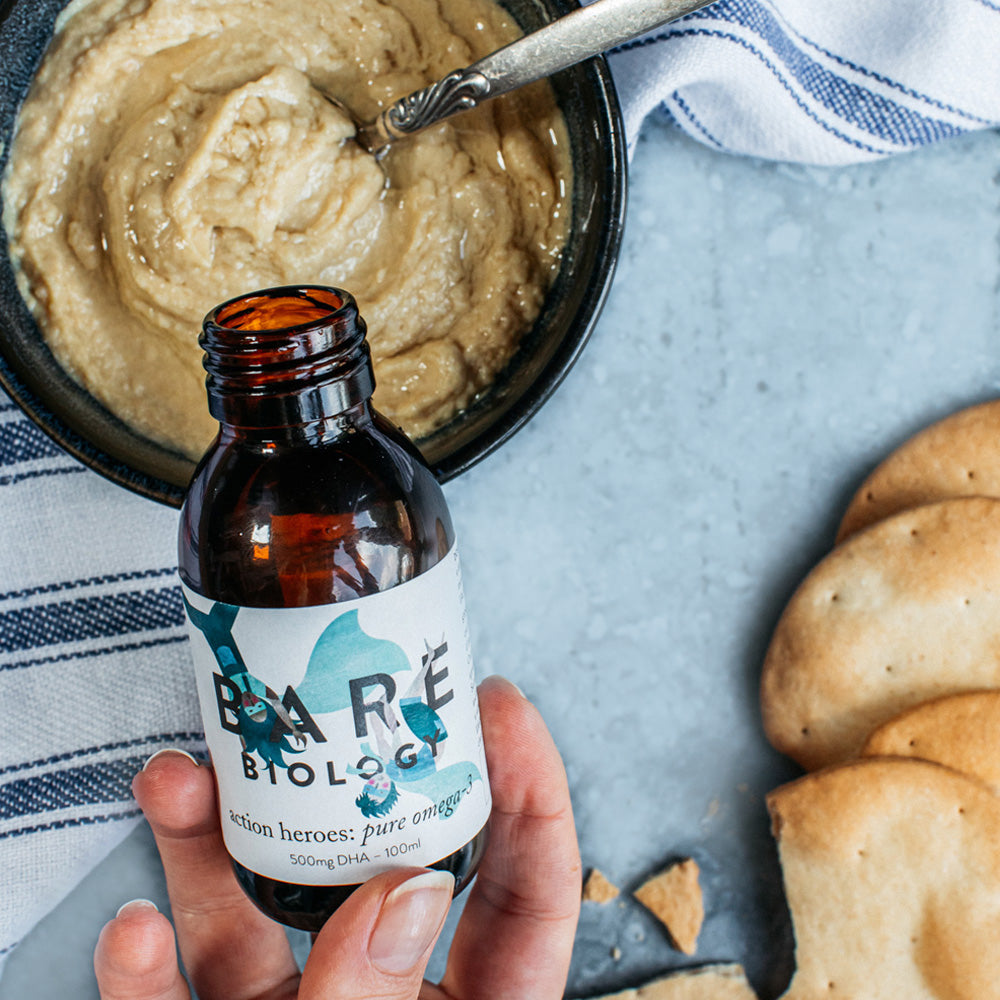
How can I get my child to take their omega-3 supplement?
Action Heroes omega-3 liquid has a delicious natural Sicilian lemon flavour and many children don’t mind drinking their daily dose neat. It’s worth giving it a go to see if your children will take it this way, as they may surprise you.
But if you’re not having much luck this way, you can disguise a fish oil supplement in all manner of ways. We asked Mary van der Westhuizen, a qualified nutritional therapist who runs a private practice in London, for her advice. Here are her top three fish oil disguising tips…
Tips for taking
-
In their porridge
Top with cinnamon to mask the flavour if they aren’t keen on the lemon. Cinnamon is also great for balancing blood sugar levels so will help to stabilise your child’s mood and appetite.
-
In a fruit or vegetable smoothie
The more vegetables you can include in your smoothie the better so that your children are taking in less sugar than they would with a fruit smoothie. But if you have to add some fruit to make it more palatable then go for it. Just use whatever you have in your fridge and don’t worry about following a recipe.In pesto or hummus
-
In pesto or hummus
You can disguise Action Heroes liquid in any food that is cold or at room temperature. Just make sure the food isn’t subsequently heated up because omega-3 oils degrade when exposed to heat, oxygen and light. The quicker it’s consumed once out of the bottle the better.


So will omega-3 benefit my children?
Omega-3 is a great supplement to help children as they grow and develop, with DHA being such an important building block for their brains and eyes.
Just remember you need to be consistent with it. Children should take the supplement every day, as the body can take more than three months to build up its stores of this important nutrient.
We believe Action Heroes liquid is one of the best fish oils for kids. One drop (1ml) has 500mg DHA and 130mg EPA, making it the most concentrated children's fish oil on the market, bar none.
Each batch is tested for purity by International Fish Oil Standards (IFOS), the only third-party testing and certification program for fish oils, so you know that it’s safe for them to take, with no mercury or toxins.
While all fish oil brands say they’re tested for contaminants, they don’t always provide the evidence. But we’re so proud of our results that we publish them on our own website, and you can download ours on the omega 3 fish oil for kids page.





